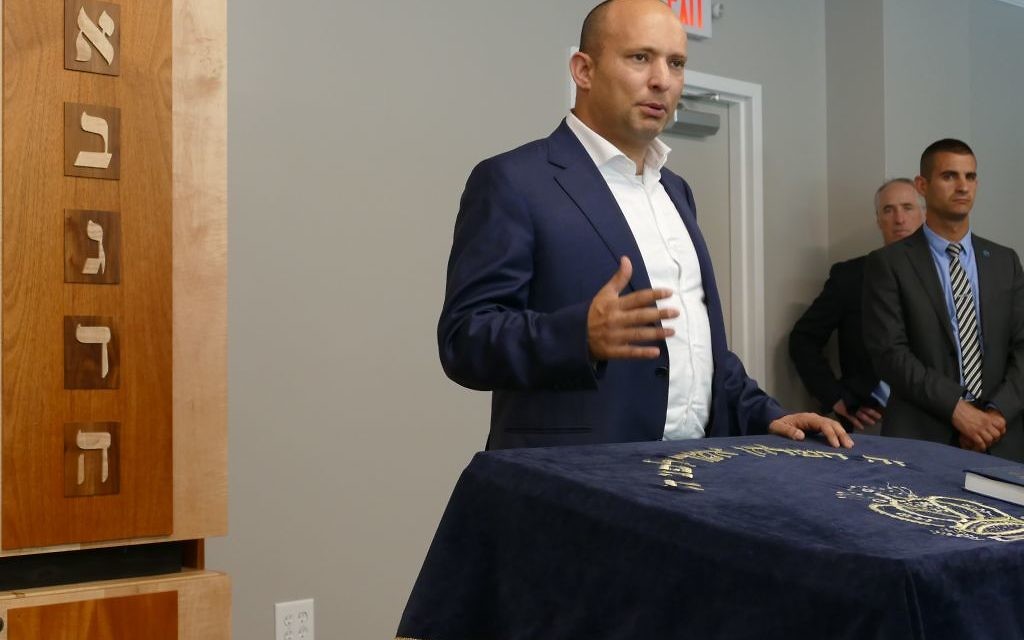Bennett Emphasizes Hard Work, Strong Jewish Ties
Education is key for sustaining next generations connection to Judaism and Israel.

When Naftali Bennett served in the Israel Defense Forces, he knew a soldier named Emmanuel Yehuda Moreno who worked his way to the top of the elite Sayeret Matkal special forces unit.
“Moreno was not exceptionally talented or fast, but he worked hard to make his way to the top,” the Israeli minister of education and Diaspora affairs told Atlanta Jewish Academy students Monday, May 8. “We are each given a set of gifts, but we must always work hard to become amazing. There are no shortcuts.”
That lesson applies to the education system itself, which has expanded to improve the integration of Arabs into Israeli society at a younger age, Bennett said. Hebrew is now taught in kindergarten instead of third grade, creating a positive trajectory through education toward employment for a million and a half Arabs.
Get The AJT Newsletter by email and never miss our top stories Free Sign Up
Although the cost of education has risen between the public and private sectors in Israel, Bennett assured AJA students that most Israeli students attend public schools, including his children. “The education may not be perfect, but we should avoid segregation at all costs, as obtaining an education in Israel is by and large free.”
He added: “Most children today are bored and are smarter than generations prior. Half the jobs no longer exist, yet we must continue preparing children for the future.”
Bennett explained the shadow education system, which involves executing ideas to get the job done. “Innovation is overrated, and entrepreneurship is underrated. At the end of the day, actions speak louder than words. The informal training received in the IDF prepares individuals for this form of thinking. It enables one to expand their capabilities, plan, change and adapt, which are standard attributes one needs in life.”
Israel has a youth movement in which kids oversee other kids and gain leadership skills.
“We assign real challenges to kids at a young age and let them thrive,” Bennett said.
He spoke to AJA fifth- to 12th-graders about academics and schools in Israel and emphasized the importance of preserving Jewish identity in a difficult time.
“Historically, the Diaspora would either make aliyah or a donation, but that has all changed,” Bennett said. “How do we help Jews stay Jewish and connected? This is the first time Israel has had to invest toward that endeavor — although not without internal debate, as most would like the money to be invested in Sderot, Israel, rather than Columbus, Ga. Yet how do we ensure the future of Jews?”
He said more than $200 million has been donated over the years for campus outreach by Hillel, Chabad and Olami.
Young Israel of Toco Hills Rabbi Adam Starr suggested further efforts to bring Israel into the U.S. education system so it does not feel like a foreign country. AJA has maintained a connection to Israel through Israeli teachers and curriculum.
“There is an incredible diversity about what Israel means from the left to the right and what keeps individuals Jewish,” Congregation Shearith Israel Rabbi Ari Kaiman said. “Conservative Judaism in America is diverse with minor differences, yet we want children to continue having a deep sense of culture and home in relation to the Jewish community, Israel and what the Torah means.”
Bennett said, “In Israel we have to be very open-minded, as we now have a Jewish home, yet we need to be more creative to help preserve a unique connection between Jews and Israel in an applicable way.”
AJA 12th-grader Mayan Schoen noted a shift in religiosity because of various elements within Jewish education, but she said that learning from teachers in Israel and through experiential education often helps.
To re-emphasize the positive aspects of the connection between Israel and Jewish education, Bennett stressed a strong Jewish identity. “Each and every one in Israel is there for you, but you should also be there for us, continue to speak up and never fall silent.”




comments